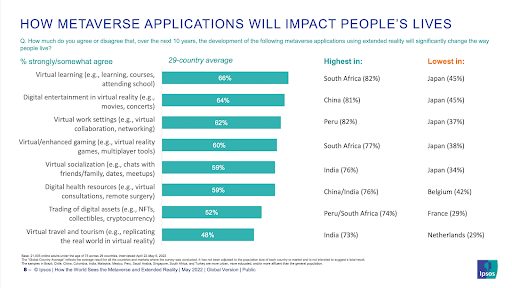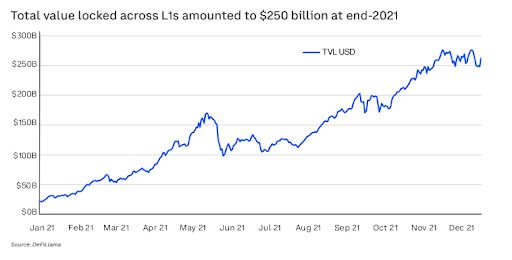More Than Two-thirds Bullish on Metaverse, Per Davos Host Survey
The World Economic Forum (WEF) commissioned a new poll exploring just how much the world believes the metaverse will change lives

Blockworks exclusive art by Axel Rangel
key takeaways
- Respondents were more positive about remote education and digital entertainment in the metaverse than digital asset trading
- The metaverse could still demand real-world intervention when it comes to NFT-related fraud
Half of adults surveyed in 29 countries said they’re excited about interacting with the metaverse — with bullish sentiment skewing higher in emerging nations, where citizens were late to the Web2 revolution.
That’s according to a new poll from Paris-based market research firm Ipsos on behalf of inter-governmental body World Economic Forum, which is currently hosting its annual Davos conference in Switzerland. The metaverse is proving a hot topic among panelists.
More than two-thirds of respondents from China, India, Peru were positive towards an eventual hyper-connected metaverse than those from developed nations such as Great Britain, Canada, Japan, Belgium, France, and Germany – where fewer than one-third were happy about the concept.
Ipsos’ sample size was relatively small: 21,005 online adults under the age of 75. Still, 80% of respondents were familiar with “virtual reality;” 61% knew about “augmented reality;” and 53% had heard the term “metaverse.”
The prospect of the metaverse is somewhat contentious in tech. Gaming companies like Roblox already have widely popular metaverses in which players can explore centralized digital realms.
Meta, formerly Facebook, on the other hand, hopes to roll out a tangible extended reality in which users control an avatar tied to physical identities, allowing players to meet up in virtual spaces for work and play.
The tech giant has flagged its intent to support NFTs and other digital collectibles, although other proponents envision an interconnected virtual world where blockchain-powered digital identities transcend the walled gardens that have defined Web2.
“Familiarity and favorability toward the new technologies are also significantly higher among younger adults, those with a higher level of education, and men than they are among older adults, those without a college-level education, and women,” Ipsos wrote in a blog post.

During a Davos panel Wednesday focusing on metaverse developments, Meta Chief Product Officer Chris Cox described the concept as a way of transitioning from 2D digital environments to 3D experiences.
“When you think about the current internet, we have flat pages served by screens,” Cox said. “One of the most important trends in computing moved them from a basement to our desktop, to our pocket. We [Meta] believe, as an industry, as the metaverse gets closer – eyes, hands, speech, and keyboard input goes away, peering at screens in our pockets goes away.”
Education more compelling than crypto trading in the metaverse
But exactly how blockchain and cryptocurrency fit into the emerging metaverse concept remains unclear.
Decentraland and rival Sandbox are two examples of crypto-powered platforms embracing the idea, offering crypto users the opportunity to acquire their own slices of the metaverse in the form of land plots on which they can build their own structures. Casinos inhabit these metaverses, giving users a use-case for digital assets.
The games themselves don’t run exclusively on distributed ledgers, but land deeds and other assets are managed by blockchains. Rapper Snoop Dogg is setting up in Sandbox’s metaverse while Wall Street bank JPMorgan has opened its own “lounge” in Decentraland.
But there must also be some rules governing our metaverse experiences, said Minister of State for Artificial Intelligence in the United Arab Emirates (UAE) Omar Al Olama. The UAE has been an early adopter of the nation-state-driven metaverse, facilitating its first virtual wedding in Decentraland last week.
“There are different kinds of risks we must pay attention to,” said Al Olama. “Financial transactions which happen in the real world for goods bought in the metaverse such as Bored Apes – if you actually pay money for that but you don’t get it in the metaverse, someone has to pay for that with an agreement on how that’s enforced.”
And so, Ipsos asked respondents: “How much do you agree or disagree that, over the next 10 years, the development of the following metaverse applications using extended reality will significantly change the way people live?”

Two-thirds somewhat or strongly agreed increased access to virtual learning via the metaverse would significantly change their daily lives. About the same number said entertainment, such movies and concerts, would do the trick.
Trading of digital assets such as cryptocurrency and NFTs ranked much lower. Just 52% of respondents agreed that metaverse-related digital asset markets would significantly change lives – that rose to 74% for adults polled from Peru and South Africa and dropped to 29% in France.





